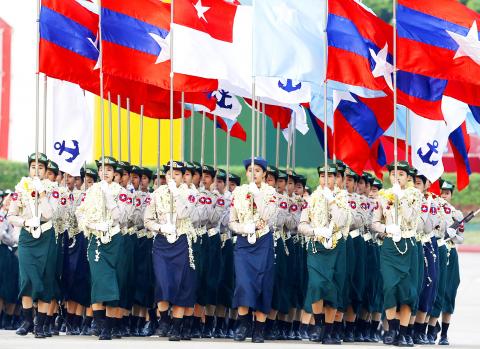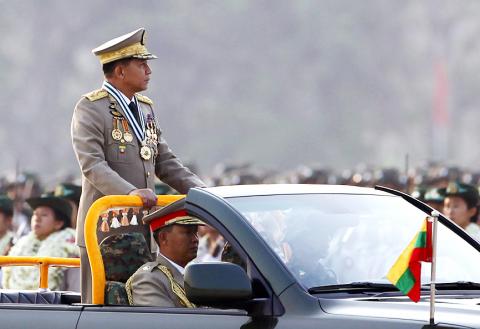Myanmar’s powerful army chief yesterday vowed to keep the nation “on the path to democracy,” days before Aung San Suu Kyi’s civilian government takes office after decades of army rule.
Senior General Min Aung Hlaing made the remarks at an annual display of military might by Myanmar’s armed forces, a body that long crushed democratic aspirations with an iron fist but has since stewarded the country through a remarkable transition.
“I would solemnly impart the fact that the Tatmadaw [army] will cooperate to bring about the prosperity of the union and its citizens,” he said during a speech to troops at the annual Armed Forces Day parade in Naypyidaw.

Photo: EPA
“The two main obstacles to democratization are a failure to abide by the rule of law and regulations and the presence of armed insurgencies. These could lead to chaotic democracy,” he said. “Only if these two obstacles are properly tackled and overcome will there be advancement on the path to democracy.”
Myanmar has undergone a stunning political transformation since 2011, blossoming from isolation under successive juntas to become an increasingly vibrant nation.
Its growing political openness was crowned by November last years’ election that saw Aung San Suu Kyi’s National League for Democracy storm to victory.

Photo: AP
After a lengthy transition her government is to take over from the outgoing army-backed administration on Wednesday, ending more than five decades of direct and indirect military rule.
Aung San Suu Kyi, who is banned by a military-era constitution from becoming president, is to serve as minister of foreign affairs but has vowed to rule through Burmese president-elect Htin Kyaw.
Her ability to cooperate with and confront the still powerful military will be a crucial test of her government, which faces a range of challenges including poverty, corruption, years of chronic under-investment and insurgencies by ethnic minority rebels.
The military still holds strong political sway under a charter that reserves a quarter of the Burmese parliament’s seats for unelected soldiers and grants the army chief direct control over three key ministries: Home affairs, border affairs and defense.
It also has significant financial clout, with two sprawling military-owned conglomerates owning vast chunks of the economy and decades of wealth accumulated by the military elite over the years.
Yesterday’s parade was a vivid reminder of the military’s wealth with polished battle tanks, surface-to-air missiles, armored vehicles and helicopters all on display.
During junta rule, spending on education and healthcare was a fraction of the military’s budget, a daunting legacy which now confronts the incoming civilian government.

MONEY GRAB: People were rushing to collect bills scattered on the ground after the plane transporting money crashed, which an official said hindered rescue efforts A cargo plane carrying money on Friday crashed near Bolivia’s capital, damaging about a dozen vehicles on highway, scattering bills on the ground and leaving at least 15 people dead and others injured, an official said. Bolivian Minister of Defense Marcelo Salinas said the Hercules C-130 plane was transporting newly printed Bolivian currency when it “landed and veered off the runway” at an airport in El Alto, a city adjacent to La Paz, before ending up in a nearby field. Firefighters managed to put out the flames that engulfed the aircraft. Fire chief Pavel Tovar said at least 15 people died, but

LIKE FATHER, LIKE DAUGHTER: By showing Ju-ae’s ability to handle a weapon, the photos ‘suggest she is indeed receiving training as a successor,’ an academic said North Korea on Saturday released a rare image of leader Kim Jong-un’s teenage daughter firing a rifle at a shooting range, adding to speculation that she is being groomed as his successor. Kim’s daughter, Ju-ae, has long been seen as the next in line to rule the secretive, nuclear-armed state, and took part in a string of recent high-profile outings, including last week’s military parade marking the closing stages of North Korea’s key party congress. Pyongyang’s official Korean Central News Agency (KCNA) released a photo of Ju-ae shooting a rifle at an outdoor shooting range, peering through a rifle scope

South Korea would soon no longer be one of the few countries where Google Maps does not work properly, after its security-conscious government reversed a two-decade stance to approve the export of high-precision map data to overseas servers. The approval was made “on the condition that strict security requirements are met,” the South Korean Ministry of Land, Infrastructure and Transport said. Those conditions include blurring military and other sensitive security-related facilities, as well as restricting longitude and latitude coordinates for South Korean territory on products such as Google Maps and Google Earth, it said. The decision is expected to hurt Naver and Kakao

India and Canada yesterday reached a string of agreements, including on critical mineral cooperation and a “landmark” uranium supply deal for nuclear power, the countries’ leaders said in New Delhi. The pacts, which also covered technology and promoting the use of renewable energy, were announced after Indian Prime Minister Narendra Modi and Canadian Prime Minister Mark Carney hailed a fresh start in the relationship between their nations. “Our ties have seen a new energy, mutual trust and positivity,” Modi said. Carney’s visit is a key step forward in ties that effectively collapsed in 2023 after Ottawa accused New Delhi